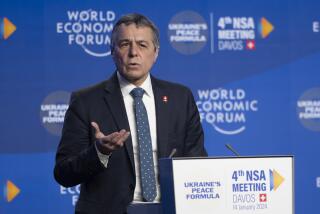Human Rights Key to Arms Talks, Soviets Told : No Accord on Conventional Weapons Without Progress on Issue, West Insists
- Share via
VIENNA — The 35-nation conference reviewing the 1975 Helsinki agreements on security and cooperation in Europe recessed for the Christmas holidays here Friday with Western delegates warning the Soviet Union that they will not negotiate on conventional arms reductions in Europe without substantial improvements in agreements on human rights.
“No agreement on human rights--no deal. That remains our position,” British Ambassador Laurence O’Keefe summarized, after noting that there are only four sentences of an agreed text on human rights so far after 12 months of discussions.
“A breakthrough has been achieved in the arms control policies of the great powers, but no signs of the type of breakthrough that we need are yet to be seen here in Vienna,” said Ambassador Ekkehard Eickhoff of West Germany, in a reference to last week’s U.S.-Soviet agreement on banning ground-launched mid-range nuclear missiles.
“Real confidence and security in Europe will continue to elude us if the causes of tension remain,” said Dutch Ambassador Hans Meesman. “Hence our determination that this Vienna meeting reflect progress in the non-military areas of relationship between states, particularly the human dimension.”
Norwegian Ambassador Leif Mevik said that “Bold steps in human rights are a fundamental prerequisite for a successful conclusion” in Vienna and “We cannot negotiate down to meaningless phrases.” He continued:
“Is it really unreasonable to ask for the free exercise of the right to leave one’s own country and to return to it? Is it really unreasonable to ask for positive decisions on applications for travel for family or urgent humanitarian reasons within specific time frames?”
Soviet Ambassador Yuli B. Kashlev responded to this sustained Western barrage at a final plenary meeting by accusing others of “trying to make the whole Vienna meeting a kind of hostage to humanitarian aspects. Those who make use of such tactics should bear all the responsibilities for the possible consequences.”
Nevertheless, the solid across-the-board stance of the Western Europeans on the human rights question is a clear message to Moscow and Soviet leader Mikhail S. Gorbachev that his closest neighbors on the Continent expect a lot more in the coming year than just a superpower agreement to eliminate ground-launched intermediate-range nuclear weapons.
U.S. Ambassador Warren Zimmerman spoke only briefly at the final meeting, leaving the detailed attacks on the Soviet human rights stance to the Europeans. But he made it abundantly clear that the results of the Vienna meeting “must go well beyond” what has been achieved in past meetings in Madrid and Bern, Switzerland, “and must reflect a new East-West climate and new thinking--a document devoid of substance would be no more acceptable to us than a document containing nothing but trivial undertakings.”
Zimmerman concluded by quoting back to the Soviets the words of their own leader: “The issue is winning trust abroad by earning trust at home. The issue is recognizing, as General Secretary Gorbachev put it precisely, that ‘The world cannot be considered secure if human rights are violated in it.’ ”
Soviet Ambassador Kashlev devoted about half of his speech to a call for speedy agreement on a mandate for a new conference on reducing conventional military forces in Europe, which is being negotiated on the sidelines of the Helsinki review discussions. However, the Soviet Union has been trying to give priority to European disarmament ahead of humanitarian questions ever since this “Helsinki process” began back in 1972.
The Soviets also renewed their call for a human rights conference to be held in Moscow, a proposal which so far is finding very little support in the West. Danish Ambassador William Friis-Moller, speaking on behalf of the 12 nation-members of the European Communities, pointed to the harassment in Moscow last week of a gathering of the dissident group called “Glasnost Press Club” and said, “This is a strange spectacle in a capital which is being offered as a site for a conference on humanitarian issues.”
The Vienna meeting resumes Jan. 22, and officials hope to wind it up by Easter.
More to Read
Sign up for Essential California
The most important California stories and recommendations in your inbox every morning.
You may occasionally receive promotional content from the Los Angeles Times.













